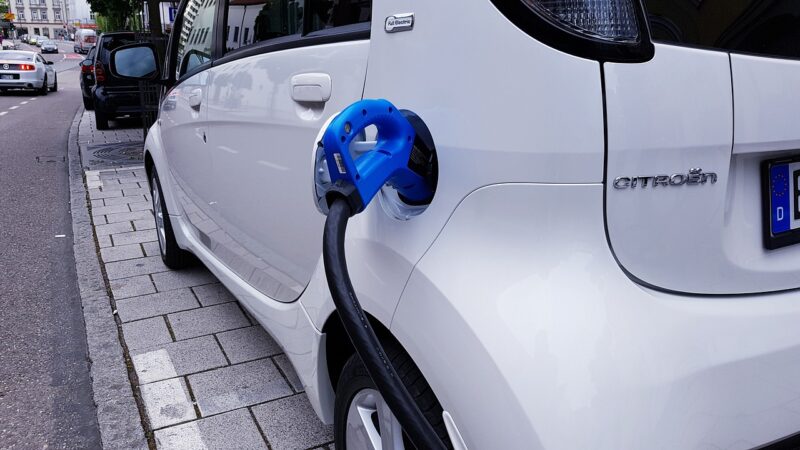Why EVs Are the Key to Reducing Our Dependence on Fossil Fuels
November 12, 2024

Electric Vehicles (EVs) are not just a trend; they represent a paradigm shift in how we think about transportation and energy consumption. As the world grapples with climate change and the depletion of fossil fuel resources, the transition to electric vehicles is emerging as a critical solution to reduce our dependence on fossil fuels.
EVs offer a cleaner, sustainable alternative to conventional gasoline or diesel-powered vehicles, significantly reducing greenhouse gas emissions and paving the way for a greener future.
The Current Dependence on Fossil Fuels
The global transportation sector relies heavily on fossil fuels, primarily due to the historical prevalence of vehicles powered by internal combustion engines (ICE). In the United States alone, transportation accounts for about 29% of greenhouse gas emissions, the largest share among all economic sectors. Cars, trucks, and buses fueled by gasoline and diesel contribute significantly to air pollution and climate change.
Moreover, dependence on fossil fuels not only has environmental implications but also affects energy security and economic stability. Fluctuations in oil prices can impact economies worldwide, leading to economic instability and uncertainty. As we face finite fossil fuel reserves, the exploration for alternative energy sources has become imperative.
The Advantages of Electric Vehicles
EVs offer numerous advantages compared to traditional vehicles, which contribute to reducing our dependence on fossil fuels:
- Reduced Emissions: EVs produce zero tailpipe emissions. When charged using renewable energy, their lifecycle emissions can be significantly lower than those of ICE vehicles. This reduction in greenhouse gases is critical in combating climate change.
- Energy Efficiency: Electric motors are inherently more efficient than combustion engines. While traditional vehicles convert only about 20% of the energy stored in gasoline to move the car, EVs utilize about 60% of the electrical energy from the grid to power the wheels, resulting in less energy waste.
- Lower Operating Costs: EVs tend to have lower fueling and maintenance costs compared to ICE vehicles. The cost of electricity is generally less than gasoline or diesel, and EVs have fewer moving parts, reducing the need for frequent maintenance.
- Energy Independence: By transitioning to EVs, countries can reduce their reliance on imported oil, helping to buffer against geopolitical tensions and price volatility in fossil fuel markets.
- Integration with Renewable Energy: EVs can be charged from renewable energy sources such as wind and solar, further decreasing reliance on fossil fuels and enhancing grid stability through vehicle-to-grid (V2G) technologies.
Government Support and Incentives
Across the globe, governments are recognizing the urgency of adopting EV technology as part of their commitment to sustainability. Many countries have implemented attractive incentives to encourage consumers to switch from fossil fuel vehicles to electric alternatives:
- Tax Credits and Rebates: In many regions, consumers can benefit from tax credits or rebates when purchasing an electric vehicle, reducing the upfront cost significantly.
- Charging Infrastructure Investment: Governments are investing in the expansion of EV charging networks, making it easier for consumers to adopt electric vehicles without range anxiety.
- Regulatory Changes: Some countries are introducing regulations to phase out gasoline and diesel vehicles in the coming decades, aiming for a major switch to EVs and zero-emission vehicles.
Challenges Ahead for Electric Vehicles
Despite the advantages, the transition to electric vehicles is not without challenges. Addressing these issues is crucial for bolstering their acceptance and effectiveness in reducing fossil fuel dependency:
- Battery Production and Recycling: The production of EV batteries involves mining for lithium, cobalt, and nickel, which can have environmental and ethical implications. Additionally, developing effective recycling methods for worn-out batteries remains a challenge.
- Charging Infrastructure: Even as investments increase, the availability of charging stations in some areas remains insufficient, particularly in rural locations. Efficient deployment of an extensive charging network is vital for widespread EV adoption.
- Range Anxiety: Many consumers still lack confidence in the distance an electric vehicle can travel on a single charge compared to traditional vehicles. Innovations like faster-charging technologies and extended-range batteries are essential to alleviate these concerns.
- Grid Capacity and Renewable Integration: An increase in EVs will put additional strain on electric grids, requiring updates and enhancements to accommodate the increased demand, particularly during peak hours.
The Future of Electric Vehicles
The future appears bright for electric vehicles as advancements in technology, coupled with public policy reforms, drive the transition away from fossil fuel dependence. Emerging technologies will enhance battery performance, enabling longer ranges and faster charging times, while innovations in autonomous driving could reduce vehicle ownership needs.
Moreover, consumer attitudes are shifting. As awareness of environmental issues grows, consumers are gravitating towards sustainable choices, with many regarding EVs as a viable option.
As major automotive manufacturers shift focus to electric platforms, we can expect a wider variety of models that meet diverse consumer demands, making electric mobility accessible to a broader audience.
Conclusion
Electric vehicles have the potential to be the cornerstone of a sustainable future, significantly reducing our reliance on fossil fuels and mitigating the impacts of climate change. While challenges remain, the combination of technological advancements, supportive governmental policies, and shifting consumer preferences will play a pivotal role in accelerating their adoption.
As we embrace the electric vehicle revolution, each of us has an essential role to play. Whether you’re a policymaker, a consumer, or a business leader, the path to a more sustainable future begins with a commitment to change. Together, we can drive the shift towards electric mobility and cultivate a cleaner, greener planet for generations to come.








